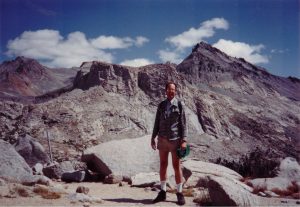18. Recovery or Just Remission?
Table of Contents
 Four years after being struck by CFS, I had improved enough to consider myself recovered. I lived a normal life for a person of my age and had resumed taking long hikes, my favorite measure of recovery. (That’s me in the photo, at Kaweah pass in the Sierras.) But I found myself haunted by new questions: Will my improved health last? Have I truly recovered or am I just experiencing a remission? Will I ever be able to see my improvement as permanent?
Four years after being struck by CFS, I had improved enough to consider myself recovered. I lived a normal life for a person of my age and had resumed taking long hikes, my favorite measure of recovery. (That’s me in the photo, at Kaweah pass in the Sierras.) But I found myself haunted by new questions: Will my improved health last? Have I truly recovered or am I just experiencing a remission? Will I ever be able to see my improvement as permanent?
The paragraph above was written in 2004. When I re-visited this chapter in 2010, six more years had past and I could still report that I was enjoying good health. If anything, my improvement had continued. Sometimes I was able to do more than I did before CFS came into my life. Pre-CFS, I enjoyed hiking trips on which I walked 15 to 17 miles a day. In the fall of 2003, I had a three-day hiking trip on which I walked 18 miles a day. In 2009, I celebrated turning 65 by taking a hiking trip of more than 160 miles. And I repeated that trip five years later when I was 70. If I can do that, I am a very lucky person.
On the other hand, I experience mild symptoms of CFS at times, usually brain fog triggered by crowds and noisy places. My response on such occasions is to leave the setting and, sometimes, to take a brief rest. This experience suggests that I have not banished CFS entirely, even if it is dormant most of the time. A good description of me would be a recovered PWC (person with CFS), meaning that CFS is not gone but rather controlled.
What about the future: will my recovery last? I think of the permanence of my recovery in terms of probability, rather than as a yes or no proposition. It is likely that the more time passes without a relapse, the more the odds tilt in favor of permanent recovery, but probability is not certainty. I expect to remain sensitive to my body and responsive to its signals for the rest of my life. And I am very grateful for my second chance to have a normal life.